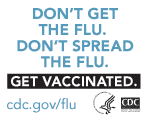CDC In the News
CDC Staff in Kenya Persist Despite Violence
By Linet Atieno Otieno
Published: February 15, 2008
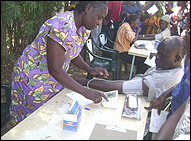 A nurse takes the blood pressure of a patient during a camp held by KEMRI-CDC.
A nurse takes the blood pressure of a patient during a camp held by KEMRI-CDC.Since December 29, 2007, the country of Kenya has endured violence against people and property after voters and members of rival political parties disputed the results of the presidential election. CDC offices in Nairobi and Kisumu were closed December 31 through January 4 because of concerns about staff safety. Both offices re-opened the week of January 7, but sporadic violence and demonstrations have continued to interrupt transportation, causing shortages of food and fuel.
There have been no deaths or serious injuries among the 144 American and locally employed CDC staff or the 871 Kenyans who work for the Kenya Medical Research Institute-CDC (KEMRI-CDC) collaboration. However, nearly all have suffered a loss, whether the death or injury of a friend or family member, the loss of property, or the ability to move freely from homes and workplaces.
About 35 KEMRI-CDC staff have had to relocate from western Kenya to other parts of the country after being threatened because of their ethnic background. Whether and when they will be able to return is still unclear. And in late January, 32 American CDC assigned staff and their families in Kisumu were directed by the US Embassy to relocate to Nairobi until the situation in western Kenya improves.
Amid the chaos, KEMRI-CDC staff across Kenya have continued their commitment to public health.
Following are representative stories of KEMRI-CDC staff contributions in the violent aftermath of the elections.
Danger in the Line of Duty
Kibera, one of the informal settlements in Nairobi and also the largest slum in Africa, was one of the areas most affected by post-election violence. A lot of property in the area was destroyed, and many people living in Kibera were killed or injured because of the violence. Tension remains and there continue to be sporadic outbreaks of violence. Kibera is also one of the primary project areas for KEMRI-CDC's International Emerging Infections Program, including one of two sites in the country where surveillance for certain infectious diseases takes place.
When violence first broke out, most people avoided Kibera because of the potential to be caught up in the unrest.
In the first violent days following the election, the Tabitha Clinic at Kibera was the only clinic open in the area, according to the chief of CDC's International Emerging Infections Program, Dr. Robert F. Breiman. He and Dr. Henry Njuguna, medical officer in charge of the clinic, saw the need when other staff couldn't return to Nairobi and with a few nurses opened the clinic. "We saw patients who had been wounded and others with diarrheal disease and pneumonia."
An ongoing project at Kibera is monitoring 26,000 households every two weeks for cases of pneumonia, diarrhea, fever, and jaundice. Kibera Surveillance Coordinator Beatrice Olack said she has never faced as many challenges as during the post-election violence. Data-gathering has continued when possible, but Olack must constantly weigh the safety of the staff with the benefits of continuing the program. As a result of the violence, community interviewers have been able to reach only 10,000 of the households because so many people have re-located to avoid the violence.
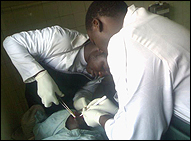
Christopher Odero and Fredrick Otieno work on an injured man at the Provincial General Hospital.
The interviewers have also been challenged by demonstrators who say "they shouldn't be working." Olack said, "They held one interviewer hostage because he refused to give them my number." The situation resolved when she spoke to the angry crowd.
She re-assigned some interviewers to desk work because as members of a particular tribe they would be in danger if they walked through the area. At other times, she has pulled all interviewers from the field when the surrounding situation grew too tense. KEMRI-CDC staff members who work at the Tabitha free medical clinic in Kibera have continued to make the dangerous commute any way they can.
Ondari Mogeni is a clinical officer at the Tabitha Clinic. One morning his supervisor called and asked him to come to work quickly to care for the growing numbers of patients who needed to be seen. Demonstrators were out that day and public transportation was spotty, but he made his way to a bus and headed for Kibera. Along the way, a crowd of demonstrators stopped the bus and brandished crude weapons. The bus was forced to turn around and all the passengers got off.
Pretending to be a demonstrator, Mogeni walked to Kibera and was able to care for the patients who are seen for free at the clinic because they participate in the surveillance program. On days that are relatively calm, the clinic staff extend hours so that they can see more patients. The extended hours are needed because so many clinics and dispensaries in the Kibera slum have been closed or burned down.
Habiba Ali Amin is also a clinical officer at the Tabitha Clinic. When she returned to Nairobi from her rural home in Garissa district after the December holidays, she found Nairobi "at war." Ali Amin trudged long distances to Kibera despite the tension. "There are very few clinics in Kibera, if we don't come to work, then who will?" she asked. Ali Amin and other KEMRI-CDC staff are also volunteering at Nairobi's Jamhuri Park, where thousands of people displaced by the violence are living. Under appalling conditions, the health providers offer medical care and counseling.
Threats "Can't Keep Me from My Work"
When the election violence began, Mary Agola, a nurse with the CDC International Emerging Infections Program (IEIP) at Lwak Hospital, and other IEIP staff were on duty. Hospital staff who had returned to their home districts to vote were unable to return because of the violence.
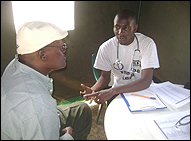
Fredrick Miruka, a Clinical Officer at KEMRI-CDC, speaks to a patient during the medical camp.
The remaining staff debated whether to continue working or go home. Realizing that hospital operations would stop if they left, they stayed. During the next two weeks, Agola and others from the IEIP team (health recorders Mary Pacho, Kennedy Jaramba, Judith Ongaro, and George Odhiambo; lab technologists Nicholas Omondi and Christine Awuor; and clinical officer Harun Chilaho) and Leah Ogendo from the Malaria Program cared for the surge of patients with burns, cuts, and bullet wounds.
Commuting to work was a frightening ordeal; staff members who belonged to one tribe were threatened by people who belonged to others. Agola and the other KEMRI-CDC staff feared for their lives, but with the support of the Lwak community—which even staged mock demonstrations to keep troublemakers away—she and her team kept the hospital running.
"It's true we were frightened, but we felt a responsibility to our work as well as to the people who were affected by the violence," Agola said. "Other hospitals had closed and people were coming long distances for help."
Staff replacements began arriving the week of January 7, but Mary and the KEMRI-CDC staff continued working until January 20th to be sure that people who needed care received it. As a result, the Lwak hospital never closed its doors.
Mary Awor, a nurse with the Malaria Program who works on a clinic-based study, found herself alone at the Saradidi Clinic during the first weeks of January when clinic staff were unable to return to the clinic. She singlehandedly provided care and treatment to pediatric, adult and maternity patients. During the height of the unrest, she even managed to organize the transfer of a woman in labor to hospital for delivery.
TB Team Works Together to Re-Test Patients and Beat Early Curfew
Janet Agaya, Project Coordinator for KEMRI-CDC's TB research program, and her team were in the field January 14 providing repeat TB tests for about 40 patients whose original results were inconclusive.
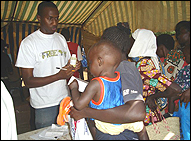
Tony Sang, a pharmacist with KEMRI-CDC, speaks to a patient.
Many of those being seen were in poor health or bedridden and could not walk. To ensure that the patients received their follow-up tests, CDC-KEMRI staff arranged to pick them up at their homes and take them to the mobile testing truck.
At noon, after about half the patients had been seen, a disturbing call came from headquarters. Because of fears of violence later that day in Kisumu, all staff and vehicles were due back at the field station by 2:00 p.m.
Agaya weighed the options: if the team stayed to complete the day's work, both the staff and vehicles could be in danger when they returned to the field station. However, if the team pulled out, they would lose credibility with the community that would be hard to regain. She made the decision to continue the follow-up x-rays and try to make the 2 p.m. deadline. By 1:30 p.m., all of the patients had been seen, and each vehicle was assigned a route that allowed them to drop off patients and return quickly to the field station. "This day was a success because of intensive coordination and team work," says Agaya. "We still have the trust of the community. If we had not stayed, I don't know if that would be the case."
Determined to Get Back to Work
Like most people, Bernard Oluoch, a medical records technician with the HIV research program, had gone to his home in Karungu area in South Nyanza near the Kenya-Tanzanian border to cast his vote in late December. And like most, he expected to be back to work at the beginning of January. When violence broke out on December 29, it was impossible to make travel arrangements to get back to Kisumu.
Expecting that the election-related violence would last only a few days, KEMRI-CDC leadership pushed the opening date for the field station near Kisumu from January 3 to January 7. By the 5th, however, the violence had not subsided and Oluoch could still not get back to Kisumu and work. After exhausting other options, Oluoch concluded there was only one way to return—on a bicycle. Although he hadn't been on a bicycle in more than 10 years, he borrowed one from a neighbor and rode the 124 miles (200 kilometers) from Karungu to Kisumu, reassuring himself that "once you know how to ride a bicycle, you never forget."
He set off early in the morning on January 6 and made it as far as Homa Bay, about halfway. Rowdy youth often blocked the road. He was stopped numerous times and had to make up stories about a family emergency. Sometimes he had to pay to get past the youth. A very tired Oluoch arrived in Kisumu at 4 p.m. on January 7 and reported to work the next day.
What kept him going during his long ride? "Work had to go on and I had to be there," he said. "I was brought up as a survivor—this means that you don't only work when things are good, but also when they are bad."
Volunteering to Save Lives
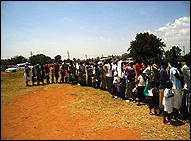
Long queues at the medical camp
Christopher Odero and Fredrick Otieno have a lot in common. They are neighbors, friends, and both work as clinical officers for KEMRI-CDC in Kisumu, Odero with the malaria program and Otieno with the HIV research program.
Two days after the election violence began, the two men visited at Odero's home. They kept thinking about the people injured in the violence and how they might be helped. They approached other KEMRI-CDC clinical staff who lived in the same neighborhood and proposed they volunteer at the Nyanza Provincial Hospital. The next day, six of them rose early and began the walk to the hospital. A sympathetic police officer finally offered them a lift.
At the hospital, they found fatigued staff who had been working for three days without rest trying to handle an overflow of patients with multiple types of wounds related to the election violence.
The KEMRI-CDC team pitched in with the pediatric and casualty sections and immediately began treating anything from general ailments to gunshot wounds and burns. They cared for one patient who had provided a safe place for a member of another tribe in his home and was slashed in the face with a machete by angry demonstrators. Both wondered if there was much they could do.
"When we were done with him, he looked as good as new," says Otieno proudly. "The man thanked us over and over again." The team continued to provide medical care at the hospital until the Kisumu KEMRI-CDC office re-opened.
"We just wanted to help our people," says Chris when asked why he volunteered his time. "We have done our part, but such things should never happen again."
In the end, three KEMRI-CDC staff—Winnie Otieno, Mary Owidi, and Sophie Omondi—continued to volunteer at the hospital through the entire month of January, providing welcome relief to the overstretched hospital staff.
Sacrificing Sleep to Meet Program Deadlines
The rotavirus vaccine clinical trial staff went to great lengths to continue the clinical trial on schedule despite the outbreaks of violence in Kisumu.
Clinical Officer David Ousu was accosted multiple times by demonstrating youths when he traveled from his home in Kisumu to the trial site in Siaya District. At times, the demonstrators demanded money so he could pass. He spent several nights in Siaya so he could continue working.
Joel Ojwando, clinical research coordinator of the rotavirus study, worked on and off throughout the December holidays to meet the requirements of the clinical trial. When some others could stay at home, he had to report so that pre-determined deadlines were met. Few of the usual "matatus" (multiple-passenger vans that transport the majority of Kenyans to work) were running during the post-election aftermath, so when he had to, he walked the 30 kilometers to work. Like colleagues in Kisumu, he also pretended to be a demonstrator when he walked through particularly risky areas. Twice, he wore bathroom slippers—common footwear for some demonstrators—during the long walk to work.
Quality Assurance Officer Daveline Nyakundi was robbed one day on his way to work, losing his cell phone and other personal objects. He persevered, however, because he felt he could not jeopardize the results of the trial.
Nyakundi and Ojwando both spent the night at the KEMRI-CDC field station in order to meet one major deadline. More than 300 files had to be reviewed for the next deadline. The two slept on chairs and nibbled on a pastry they found on a colleague's desk in order to continue working.
The two said it is the drive to do a meticulous job on time that kept them going. "There is no greater feeling than achieving the goal of meeting a set deadline," says Nyakundi. "I like achieving my goals; I could not just sit back and let work pile up," says Ojwando.
Helping the Community in Other Ways
KEMRI-CDC staff in Kisumu are helping the community in other ways. The Field Station held a blood drive on January 11 and collected 32 pints of blood for use in community hospitals. Other staff have donated household goods and money to community members in need.
KEMRI-CDC has also joined other key stakeholders in the Nyanza Province to provide medical care in various parts of Kisumu district. Open from January 24 through February 23, these medical camps are staffed by personnel who can provide drugs, medical care, psychosocial support, nutrition support, voluntary counseling and testing for HIV, some food, and legal support. On February 2, more than 1,000 people attended one such camp. More camps will be held through the end of the month.
KEMRI-CDC is also assisting with prevention and care for people arriving in Kisumu from other parts of the country because of the violence. Staff are distributing malaria treatment, distributing bednets, treating bednets, and offering medical care and other assistance.
Finally, KEMRI-CDC staff are all attending "alternatives to violence" workshops to discuss ways to bring peace to their own lives and to the province.
Linet Atieno Otieno is a communications specialist with KEMRI-CDC, Kisumu, Kenya.
Page last updated: February 17, 2008
Content source: Centers for Disease Control and Prevention
Content owner: National Center for Health Marketing
URL for this page: www.cdc.gov/news/2008/02/kenya.html
